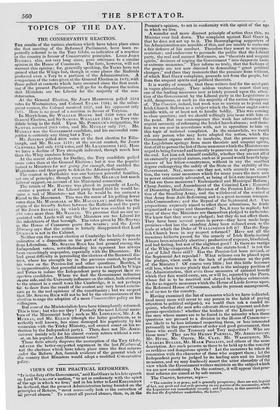TOPICS OF THE DAY.
THE CONSERVATIVE REACTION.
THE results of the various elections which have taken place since the first meeting of the Reformed Parliament, have been re- peatedly referred to in the Tory Globe, as indicative of a reaction
in the country in favour of Conservative principles. LORD JOHN RussEia. also, not very long since, gave utterance to a similar opinion in the House of Commons. The facts, however, will not warrant this opinion ; for, generally speaking, the Tories have not gained what the Whigs lost, though in sonic places the Radicals
preferred even a Tory to a partisan of the Administration. A
comparison of the votes given at the General Election in 1832, with those polled at contests which have occurred since the first meet- ing- 4 the present Parliament, will go far to disprove the notion that Ministers are too Liberal for the majority of the con- stituencies.
At the General Election, Sir JOHN HOBHOUSE polled 3284 votes for Westminster, and Colonel EVANS 1104; in the subse- quent contest, the Colonel received 2027, and his opponent only 1875. Here is no proof of a reaction in favour of Toryism.
In Marylebone, Sir WILLIAM HORNE had 3320 votes at the General Election, and Sir SAMUEL WHALLEY 2165; no Tory can-
didate being in the field. Upon Mr. PORTMAN'S resignation, Sir SAMUEL received 2869 votes, and Mr. MURRAY only 791. Mr. MURRAY was the Government candidate, and his successful com- petitor is certainly any thing but a Tory.
Mr. JEFFREY polled 4036 votes at the first election for Edin- burgh, and Mr. BLAIR. 1519; at the recent contest, Sir JOHN CAMPBELL had only 1932 votes, and Mr. LEARMONTH 1402. Here -we have a decline of Tory strength indicated, though much less than the Whig numbers betray.
At the recent election for Dudley, the Tory candidate polled more votes than at the General Election ; but it was the popular hatred to Ministers for not going far enough, that enabled the Magistrates and their party to defeat the Attorney-General. The contest in Perthshire was one between powerful families, not one of principle; though even there Mr. GRAHAM 10St much Liberal support, on account of his Ministerial connexion. The return of Mr. BAINES was placed in jeopardy at Leeds, manse a portion of the Liberal party feared that he would be- Ionic a tool of Ministers—not that lie would be too earnest a Cend to the Movement. This was the cause of his polling fewer Totes than Mr. MARSHALL Or Mr. MACAULAY ; and this was the origin of the friendly feeling between the Radicals and the party of Sir JOHN BECKETT, by which the latter was enabled to poll 300 votes more than Mr. SADLER. We presuine that no one ac- quainted with Leeds will say that Ministers are too Liberal for the inhabitants of that borough. The votes given by Mr. BAINES in the House of Commons prove the reverse; and the Leeds Mercury says that the nation is bitterly disappointed that Lord Ova:lax is not in the Cabinet.
Neither can the recent election at Cambridge be looked upon as indicative of a disposition on the part of the country to recede from Liberalism. Mr. SPRING RICE has lost ground among the Independent voters, notwithstanding his opponent has always been exceedingly unpopular, especially with the Dissenters. He bad great difficulty in persuading the electors of the Barnwell dis- trict, where his strength lay in the previous contest, to pardon his votes on the Pension-list and other questions. Besides, it 'is unquestionable, that powerful influence was used both by Whigs and Tories to induce the Independent party to support their re- spective candidates. Where we find the Government influence on one side, and the University influence on the other, both strained to the utmost in a small town like Cambridge, it is not perhaps tiaL to draw from the result of the contest any very broad conclu- sion as to the real opinions of the constituency ; but we suspect that Mr. SPRING RICE will not be led by the circumstances of the election to urge the adoption of a more Conservative policy on his colleagues. But some of the Ministerialists have been triumphantly returned. This is true ; but who are they? Precisely the most Liberal mem- bers of the Ministerial body ; such as Mr. LITTLETON, Mr. J. A. MURRAY, and Mr. ELLICE (though the latter gentleman, as is verfectly well known, has since damaged his popularity by his fonnexion with the Tricky Ministry, and cannot count on his re- flection by the Independent party). Then, does not Mr. ABER- LROMBY mainly rely for his almost certain return without a con-
• st, on his popular Anti-Ministerial votes?
These facts utterly disprove the assumption of the Tory Globe, rut even the better-supported argument in the last Blackwood, at the elections which have taken place since the first returns onder the Reform Act, furnish evidence of the general wish of the country that Ministers would adopt a modified Can.servative policy.


















 Previous page
Previous page